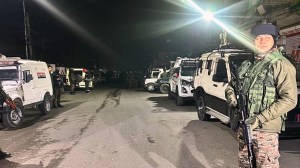‘Bhimshakti-Shivshakti’ pact in tatters, it’s a free-for-all for Dalit votes now
Ambedkar’s grandsons join hands with 12 other smaller parties to form Maha Lokshahi Samiti.
Political contenders in the state Assembly elections say that the Republican Party of India (RPI) has let its traditional Dalit vote bank down by shattering the Bhimshakti-Shivshakti promise it made. They feel that after the Shiv Sena parted ways with the BJP, Ramdas Athawale, the Dalit face of the saffron coalition,whofirstforgedanalliance with the Shiv Sena, has hopscotched to the BJP for “personal gains.”
Academic observers feel that the Dalit agenda has been lost in the political scuffle for seats, and the vote of the community is likely to be fragmented. In fact, RPI spokesperson Arjun Dangle met Uddhav Thackeray on Monday to express his solidarity, much to Athawale’s chagrin.
Dr B R Ambedkar’s grandsons Prakash Ambedkar, who leads the Bharip Bahujan Mahasangh, and Anandraj Ambedkar, leader of the Republican Sena, have joined hands with 12 other smaller political parties to form the Maha Lokshahi Samiti. The other parties that have formed an alliance include the Peasants and Workers Party, the Communist Party of India, the Ganwana Parishad from Vidharbha, Khobragade Republican Party and the Bharatiya Muslim Paksha. Anandraj feels that this will be a “third-front” that the Dalit voter will turn to when the state goes to polls on October 15.
“The Dalit vote will remain concentrated. We will be fielding at least 30 candidatesinMumbai.After the splitin the leading alliances, Dalit voters have realised that since there will be multiple candidates, they will have to concentrate their vote so that more Ambedkarites can come to power. The sentiment towards the Congress is also negative because while they led the rulingalliance, they had assured that they would sanction the Ambedkar memorial in the Indu Mills compound. But for two years after that they took no action. Dalit voters have realised that the Congress makes hollow assurances,” said Anandraj.
Prakash Ambedkar said that there are three main reasons for Dalit voters to be be upset with the Congress. “Regarding the Indu Mills memorial, they have not taken any initiative. Many are unable to understand why Sonia Gandhi was opposed to the party’s alignment with the Dalits proposed by the Maharashtra Congress in 2009. And while they were in power, they did nothing to espouse the Dalit cause. If RPI could get votes, it would have been a force by itself and would not depend on the Shiv Sena. It is going to be a six-cornered contest this time,” he said.
Founder and president of the People’s Republican Party (PRP) Jogendra Kawade said, “The only alliance in existence now is that of Congress and PRP. Whether it is Dalits or OBCs, their bent is towards a secular government. We are confident that the Congress and PRP alliance will secure at least 80 percent of the Dalit vote.”
Kawade added that the BJP-Shiv Sena-RPI alliance was only upto “theatrics over taking forward the Dalit cause. He said, “Athawale’s moves are driven by selfish gains and not the interest of the Dalits.”
Professor of sociology at the Mumbai University B V Bhosale, however, said that the votes of the community will undoubtedly be splintered. “I don’t think either the BJP or the Shiv Sena will give the Dalit political parties a share in the power structure. The arrangements that are being worked out by the RPI are temporary but what they need to do is be independently powerful.” He said that the Dalits’ existence as a an effective political power pressure group itself was in question. He said that even parties like the RPI have not been able to bring about a degree of change for Dalits.
In Bhosale’s assessment, “No single party will get the majority vote. Smaller parties that have formed the Maha Lokshahi Samiti are like toppings on ice-cream. “They will make no difference,” Bhosale said.
mayura.janwalkar@expressindia.com







